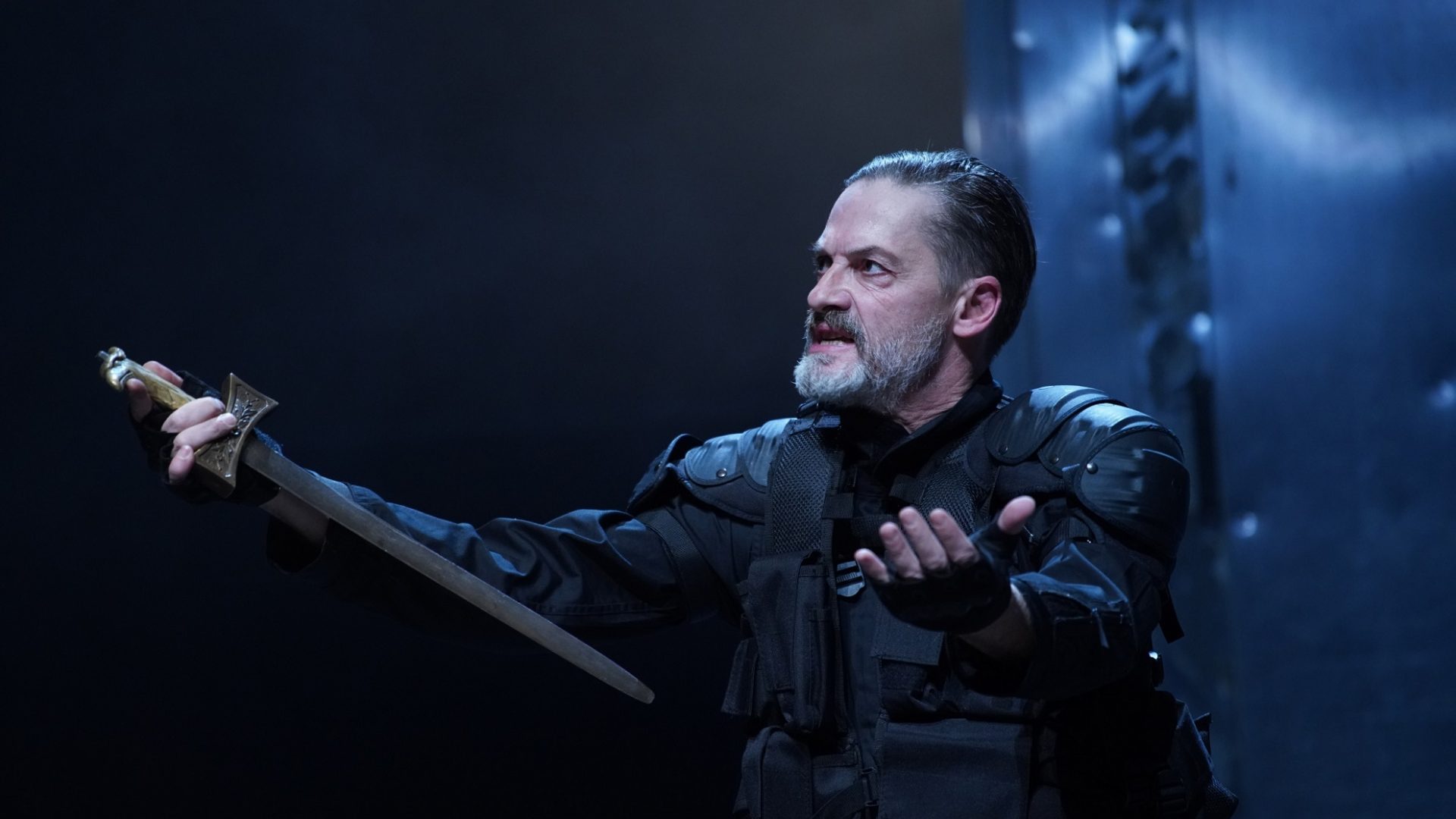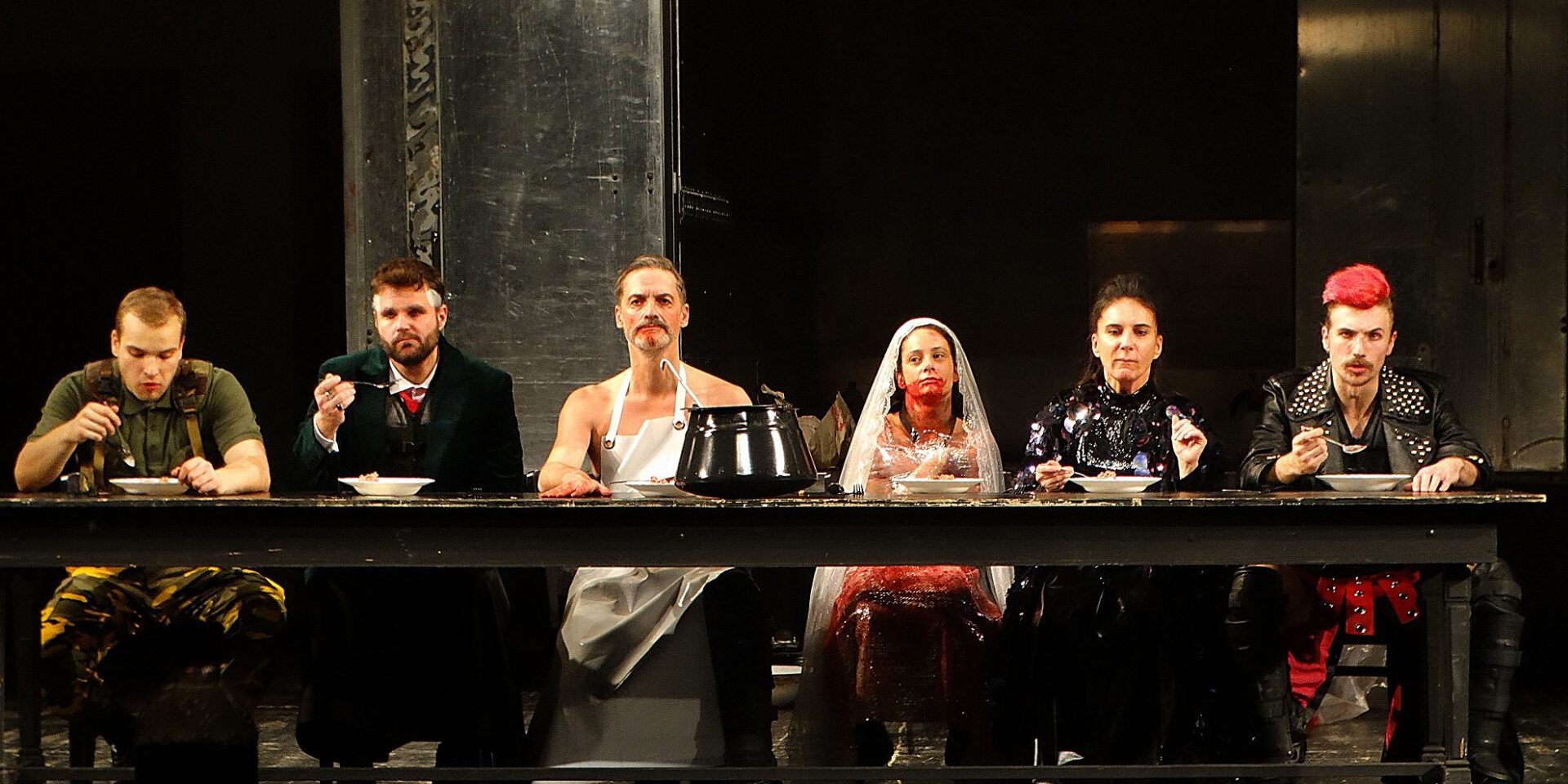Yugoslav Drama Theatre, Belgrade, premiere 27th December
Some things should not be easy to watch. Director Andraš Urban is known for his confrontational approach. His version of Titus Andronicus, Shakespeare’s blood-soaked early revenge tragedy, is not a comfortable production to sit through. It is often upsettingly violent and oppressively grim.
Urban draws a clear line between Shakespeare’s Roman generals and a recognisable present. He pairs stomach-churning acts of retribution with a thumping percussive soundtrack performed live. At the start of the play the word Tito is spelled out in block letters on stage only for the ‘o’ to be carried away leaving us with the name of the title character – and a power vacuum which will need to be filled. An emblem of a double-headed eagle is suspended over the stage as a series of body bags are unceremoniously hurled out of the back of a truck and buried in a pit.
Titus Andronicus is Shakespeare’s bloodiest play. Limbs get hacked off and heads cut off. Violence is omnipresent, almost a character in its own right. Revenge is literally served up to people. The graphic imagery in Urban’s production evokes both the crimes carried out in Kosovo in the 1990s and the horrific acts of violence more recently committed by criminal gangs in Serbia which saw tabloids filled with sickening pictures of mutilated and decapitated bodies. In Urban’s hands the grotesque excesses of the play are but echoes of a world in which the line between the law makers and law breakers has long ago been blurred. If the connections weren’t clear, a song at the beginning spells it out.
Goran Šušljik plays the returning general, first seen in a soldier’s uniform that resembles a Serbian police officer’s riot gear. Šušljik captures the sense of a man driven not by power-lust – on the contrary, he rejects the offer of the throne – but a thirst for revenge that eventually consumes him. He has seen his children slain in battle and is determined to avenge them.
He orders the death of the song of captive queen Tamora, an event which leads to his daughter Lavinia being brutally raped and having her hands cut off and tongue cut out. The rape and mutilation of Lavinia is one of the biggest challenges of any staging of this play. Using the violation of a woman’s body as a catalyst for male revenge is an over-used and tired trope, one which can easily come off as voyeuristic.
Different directors have tackled it in different ways. Peter Brook famously ritualised it, draping red ribbons from Lavinia’s arms and mouth. Others have centred Lavinia’s assault, not shying away from it but thinking about the impact such scenes have on the audience. Urban’s approach is unflinching and uncomfortable. Lavinia is dragged into a truck and we hear rather than see her rape and brutalisation. We don’t witness the act, but we are forced to listen to her protracted howls, before her plastic-wrapped body is dumped on the stage. The image brings to mind Laura Palmer in Twin Peaks (one of popular culture’s most famous dead girls), but in a region where rape was used as a weapon of war it takes on an extra layer of queasy resonance.
Belović, it must be said, is brilliant as Lavinia, giving a performance of physical commitment and intensity. She squirms and whimpers in distress, her dress drenched in crimson, only to haul herself to her feet and address the audience – the complicit citizens – in accusatory fury, her tongueless words slurred. She is a dominant and defiant presence in the production. Urban has been criticised for his depiction of women on stage in the past, but measured direction and Belović’s strong performance keeps these scenes from feeling overly exploitative.

Tit Andronik Photo: Nebojsa Babic
Following the attack on Lavinia, Titus sacrifices his own hand. (Šušljik spends the rest of the performance with one arm strapped to his side). The act of self-mutilation is concealed by plastic sheeting, but the sound effects do their work on the imagination. Lavinia and Titus start protesting, calling for justice. Lavinia stands with a sign round her neck, proclaiming her status as a victim of rape. Titus scrawls graffiti on the side of the truck: “fuck society.” Lavinia as a survivor is obliged to turn herself into a symbol, to force people to look at what was done to her.
The truck remains an ominous presence on stage throughout much of the production, calling to mind Ognjen Glavonic’s film Teret (The Load), about a driver tasked with transporting mysterious cargo from Kosovo, the horrific truth about what he’s carrying slowly dawning on him. The icily lit scenography, also by Urban, has a darkly industrial quality, except for a creepily atmospheric, surreal forest interlude in which the actors don animal heads, becoming stags and antelopes.
The play’s more grotesque elements are often performed as black comedy. But Urban allows very little light to penetrate the murk and gore. The only moment that is even half-way humorous is when Tamora’s sons sing karaoke. This incongruous moment punctures the unrelenting grimness, but it is in itself grim, the banality of evil in action. The director doesn’t let the audience off the hook. There is no reprieve, even in the macabre banquet scene, which can sometimes feel absurd in its excess. Urban presents us with a tableau that resembles an inverted wedding scene, with Lavinia white veiled and streaked with her own blood, sitting beside her father as the Goth queen Tamora (Andjelika Simic, imposing in a black PVC gown) is tricked into consuming her own sons. She ends up with her face planted in the serving dish, while Lavinia gets dispatched in the carnage that follows. In the end Titus’ quest for vengeance eclipses everything.
Though the production is gruelling, it is also gripping. While Belović is the stand-out, all the performances are strong. The propulsive music by Urban’s frequent collaborator Irena Popovic pulses through the show. It even ends on a song, the lyrics for which – eye for eye, tooth for tooth, hand for hand – make the message plain, violence begets violence. A horrific cycle that continues still. It’s far from subtle, but in a climate when pictures of men grinning while holding a severed head have appeared on television, where the taint of past violence still permeates the air, subtlety has ceased to be an option. Some things should not be easy to watch.
Credits:
Natasha Tripney is a writer, editor and critic based in London and Belgrade. She is the international editor for The Stage, the newspaper of the UK theatre industry. In 2011, she co-founded Exeunt, an online theatre magazine, which she edited until 2016. She is a contributor to the Guardian, Evening Standard, the BBC, Tortoise and Kosovo 2.0








